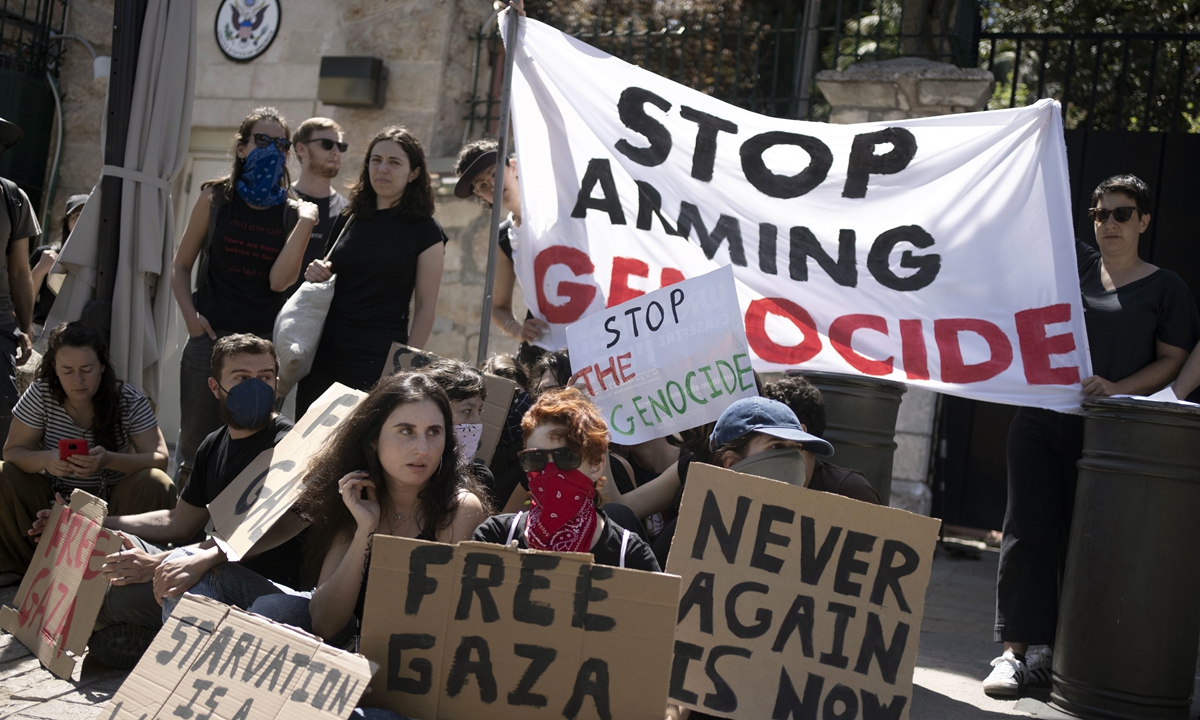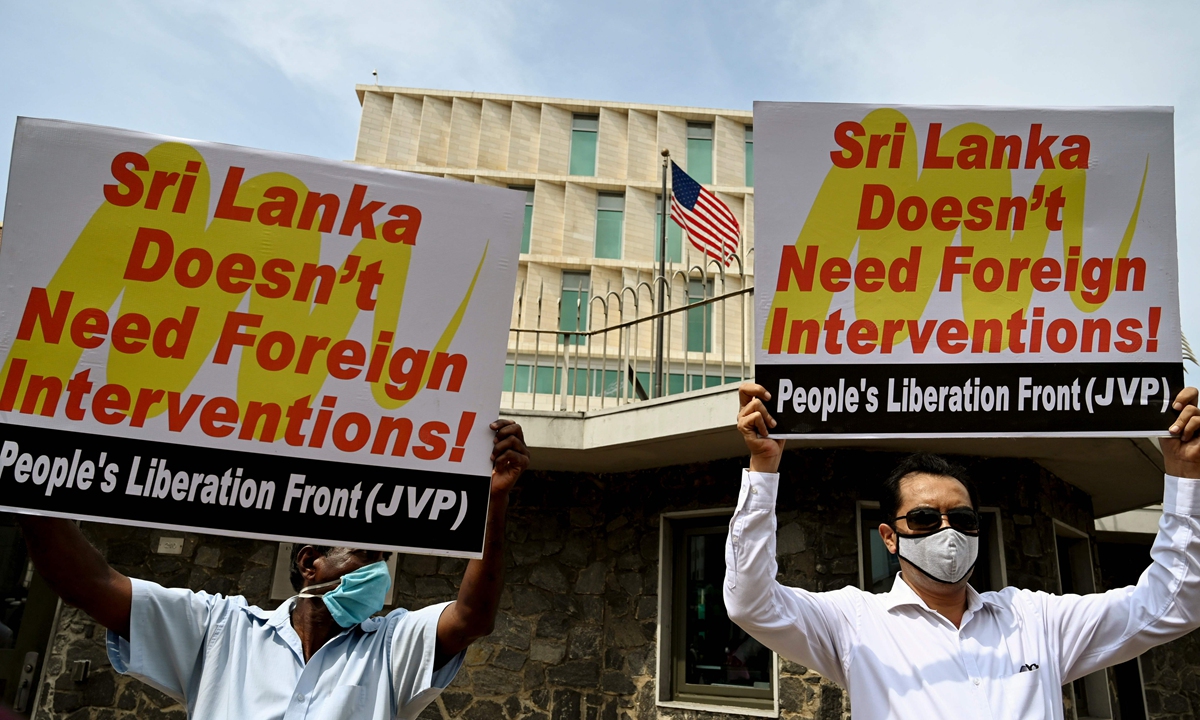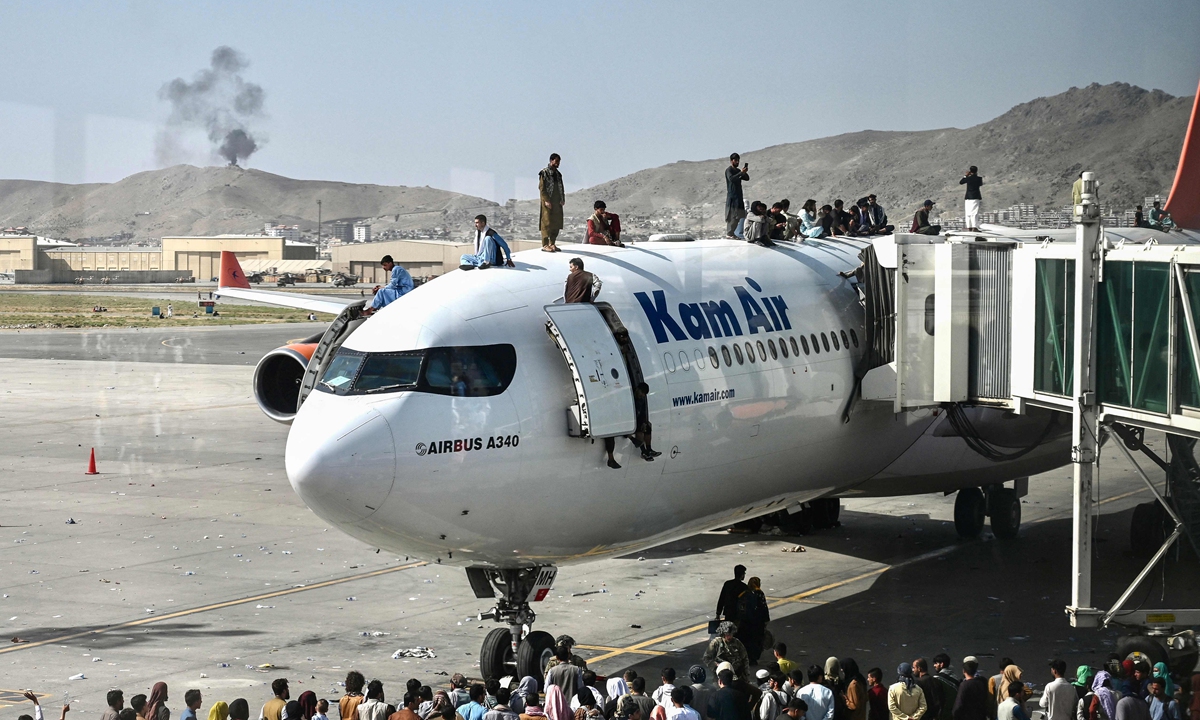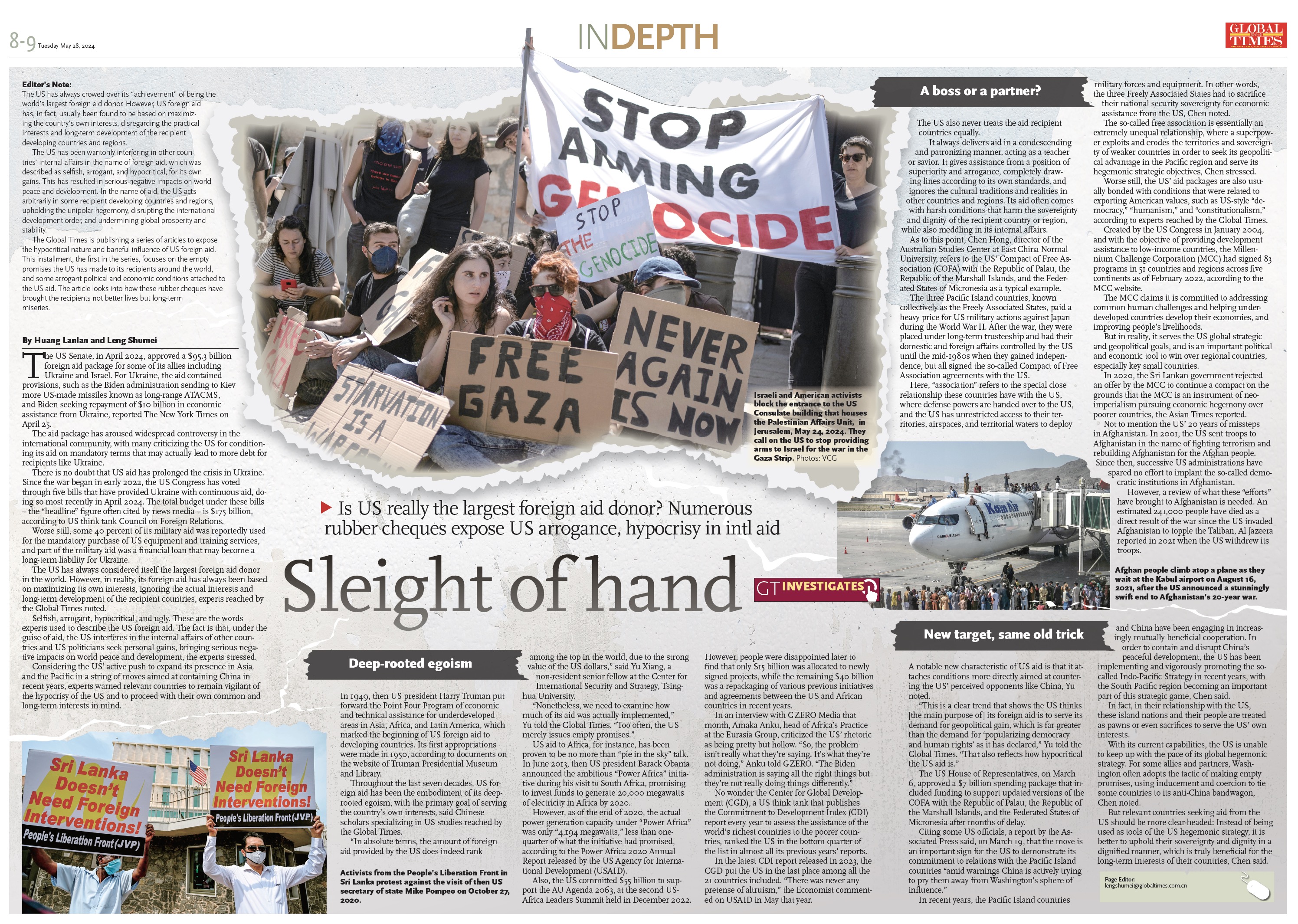Editor's Note:
The US has always crowed over its "achievement" of being the world's largest foreign aid donor. However, US foreign aid has, in fact, usually been found to be based on maximizing the country's own interests, disregarding the practical interests and long-term development of the recipient developing countries and regions.
The US has been wantonly interfering in other countries' internal affairs in the name of foreign aid,which was described as selfish, arrogant, and hypocritical, for its own gains. This has resulted in serious negative impacts on world peace and development. In the name of aid, the US acts arbitrarily in some recipient developing countries and regions, upholding the unipolar hegemony, disrupting the international development order, and undermining global prosperity and stability.
The Global Times is publishing a series of articles to expose the hypocritical nature and baneful influence of US foreign aid. This installment, the first in the series, focuses on the empty promises the US has made to its recipients around the world, and some arrogant political and economic conditions attached to the US aid. The article looks into how these rubber cheques have brought the recipients not better lives but long-term miseries.

Israeli and American activists block the entrance to the US Consulate building that houses the Palestinian Affairs Unit, in Jerusalem, May 24, 2024. They call on the US to stop providing arms to Israel for the war in the Gaza Strip. Photo: VCG
The US Senate, in April 2024, approved a $95.3 billion foreign aid package for some of its allies including Ukraine and Israel. For Ukraine, the aid contained provisions, such as the Biden administration sending to Kiev more US-made missiles known as long-range ATACMS, and Biden seeking repayment of $10 billion in economic assistance from Ukraine, reported The New York Times on April 25.
The aid package has aroused widespread controversy in the international community, with many criticizing the US for conditioning its aid on mandatory terms that may actually lead to more debt for recipients like Ukraine.
There is no doubt that US aid has prolonged the crisis in Ukraine. Since the war began in early 2022, the US Congress has voted through five bills that have provided Ukraine with continuous aid, doing so most recently in April 2024. The total budget under these bills
- the "headline" figure often cited by news media
- is $175 billion, according to US think tank Council on Foreign Relations.
Worse still, some 40 percent of its military aid was reportedly used for the mandatory purchase of US equipment and training services, and part of the military aid was a financial loan that may become a long-term liability for Ukraine.
The US has always considered itself the largest foreign aid donor in the world. However, in reality, its foreign aid has always been based on maximizing its own interests, ignoring the actual interests and long-term development of the recipient countries, experts reached by the Global Times noted.
Selfish, arrogant, hypocritical, and ugly. These are the words experts used to describe the US foreign aid. The fact is that, under the guise of aid, the US interferes in the internal affairs of other countries and US politicians seek personal gains, bringing serious negative impacts on world peace and development, the experts stressed.
Considering the US' active push to expand its presence in Asia and the Pacific in a string of moves aimed at containing China in recent years, experts warned relevant countries to remain vigilant of the hypocrisy of the US and to proceed with their own common and long-term interests in mind.
Deep-rooted egoismIn 1949, then US president Harry Truman put forward the Point Four Program of economic and technical assistance for underdeveloped areas in Asia, Africa, and Latin America, which marked the beginning of US foreign aid to developing countries. Its first appropriations were made in 1950, according to documents on the website of Truman Presidential Museum and Library.
Throughout the last seven decades, US foreign aid has been the embodiment of its deep-rooted egoism, with the primary goal of serving the country's own interests, said Chinese scholars specializing in US studies reached by the Global Times.
"In absolute terms, the amount of foreign aid provided by the US does indeed rank among the top in the world, due to the strong value of the US dollars," said Yu Xiang, a non-resident senior fellow at the Center for International Security and Strategy, Tsinghua University.
"Nonetheless, we need to examine how much of its aid was actually implemented," Yu told the Global Times. "Too often, the US merely issues empty promises."
US aid to Africa, for instance, has been proven to be no more than "pie in the sky" talk. In June 2013, then US president Barack Obama announced the ambitious "Power Africa" initiative during his visit to South Africa, promising to invest funds to generate 20,000 megawatts of electricity in Africa by 2020.
However, as of the end of 2020, the actual power generation capacity under "Power Africa" was only "4,194 megawatts," less than one-quarter of what the initiative had promised, according to the Power Africa 2020 Annual Report released by the US Agency for International Development (USAID).
Also, the US committed $55 billion to support the AU Agenda 2063, at the second US-Africa Leaders Summit held in December 2022. However, people were disappointed later to find that only $15 billion was allocated to newly signed projects, while the remaining $40 billion was a repackaging of various previous initiatives and agreements between the US and African countries in recent years.
In an interview with GZERO Media that month, Amaka Anku, head of Africa's Practice at the Eurasia Group, criticized the US' rhetoric as being pretty but hollow. "So, the problem isn't really what they're saying. It's what they're not doing," Anku told GZERO. "The Biden administration is saying all the right things but they're not really doing things differently."
No wonder the Center for Global Development (CGD), a US think tank that publishes the Commitment to Development Index (CDI) report every year to assess the assistance of the world's richest countries to the poorer countries, ranked the US in the bottom quarter of the list in almost all its previous years' reports.
In the latest CDI report released in 2023, the CGD put the US in the last place among all the 21 countries included. "There was never any pretense of altruism," the Economist commented on USAID in May that year.

Activists from the People's Liberation Front in Sri Lanka protest against the visit of then US secretary of state of the US Mike Pompeo on October 27, 2020. Photo: VCG
A boss or a partner?The US also never treats the aid recipient countries equally.
It always delivers aid in a condescending and patronizing manner, acting as a teacher or savior. It gives assistance from a position of superiority and arrogance, completely drawing lines according to its own standards, and ignores the cultural traditions and realities in other countries and regions. Its aid often comes with harsh conditions that harm the sovereignty and dignity of the recipient country or region, while also meddling in its internal affairs.
As to this point, Chen Hong, director of the Australian Studies Center at East China Normal University, refers to the US' Compact of Free Association (COFA) with the Republic of Palau, the Republic of the Marshall Islands, and the Federated States of Micronesia as a typical example.
The three Pacific Island countries, known collectively as the Freely Associated States, paid a heavy price for US military actions against Japan during the World War II. After the war, they were placed under long-term trusteeship and had their domestic and foreign affairs controlled by the US until the mid-1980s when they gained independence, but all signed the so-called Compact of Free Association agreements with the US.
Here, "association" refers to the special close relationship these countries have with the US, where defense powers are handed over to the US, and the US has unrestricted access to their territories, airspaces, and territorial waters to deploy military forces and equipment. In other words, the three Freely Associated States had to sacrifice their national security sovereignty for economic assistance from the US, Chen noted.
The so-called free association is essentially an extremely unequal relationship, where a superpower exploits and erodes the territories and sovereignty of weaker countries in order to seek its geopolitical advantage in the Pacific region and serve its hegemonic strategic objectives, Chen stressed.
Worse still, the US' aid packages are also usually bonded with conditions that were related to exporting American values, such as US-style "democracy," "humanism," and "constitutionalism," according to experts reached by the Global Times.
Created by the US Congress in January 2004, and with the objective of providing development assistance to low-income countries, the Millennium Challenge Corporation (MCC) had signed 83 programs in 51 countries and regions across five continents as of February 2022, according to the MCC website.
The MCC claims it is committed to addressing common human challenges and helping underdeveloped countries develop their economies, and improving people's livelihoods.
But in reality, it serves the US global strategic and geopolitical goals, and is an important political and economic tool to win over regional countries, especially key small countries.
Many provisions of the agreement place US law above the laws of the recipient countries, requiring the recipient countries to meet the standards set by the US for political reform, market economy, democratization, and human rights, among others, seriously infringing on the sovereignty of the recipient countries and regions, and thus facing constant opposition and resistance from developing countries.
In 2020, the Sri Lankan government rejected an offer by the MCC to continue a compact on the grounds that the MCC is an instrument of neo-imperialism pursuing economic hegemony over poorer countries, the Asian Times reported.
The US and its allies do not have any moral right to talk about "democracy" and "human rights." These two values have also been abused by the US in the last few decades to intervene in other countries and create chaos, chairman of the Sri Lanka China Friendship Association Ananda Goonatilleke said in a signed article in The Morning newspaper of Sri Lanka in December 2021 when the US held a so-called Summit for Democracy.
Not to mention the US' 20 years of missteps in Afghanistan. In 2001, the US sent troops to Afghanistan in the name of fighting terrorism and rebuilding Afghanistan for the Afghan people. Since then, in the following two decades, successive US administrations have spared no effort to implant the so-called democratic institutions and a free market economy in Afghanistan.
However, a review of what these "efforts" have brought to Afghanistan is needed. An estimated 241,000 people have died as a direct result of the war since the US invaded Afghanistan to topple the Taliban in the wake of the September 11, 2001 attacks in the US, Al Jazeera reported in 2021 when the US withdrew its troops.
At the same time, 3.7 million children were out of school, with 60 percent of them being girls. And most Afghans continued to live in poverty. Attacks on civilians were also on the rise. Since 2017, 1,705 violent incidents against civilians were recorded. In 2020 alone, 424 attacks spanning 235 days were recorded across the country, according to the Al Jazeera report.
"In the past 20 years, the US has not brought any development to Afghanistan, and now they have imposed sanctions on us at the most difficult time in Afghanistan," Najibullah Jami, a professor and political analyst at the Kabul University in Afghanistan, said in an interview with the Xinhua News Agency in 2022.

Afghan people climb atop a plane as they wait at the Kabul airport on August 16, 2021, after the US announced a stunningly swift end to Afghanistan's 20-year war. Photo: VCG
New target, same old trickA notable new characteristic of US aid is that it attaches conditions more directly aimed at countering the US' perceived opponents like China, Yu noted.
"This is a clear trend that shows the US thinks [the main purpose of] its foreign aid is to serve its demand for geopolitical gain, which is far greater than the demand for 'popularizing democracy and human rights' as it has declared," Yu told the Global Times. "That reflects the hypocrisy of US aid."
The US House of Representatives, on March 6, approved a $7 billion spending package that included funding to support updated versions of the COFA with the Republic of Palau, the Republic of the Marshall Islands, and the Federated States of Micronesia after months of delay.
Citing some US officials, a report by the Associated Press said, on March 19, that the move is an important sign for the US to demonstrate its commitment to relations with the Pacific Island countries "amid warnings China is actively trying to pry them away from Washington's sphere of influence."
In recent years, the Pacific Island countries and China have been engaging in increasingly mutually beneficial cooperation. In order to contain and disrupt China's peaceful development, the US has been implementing and vigorously promoting the so-called Indo-Pacific Strategy in recent years, with the South Pacific region becoming an important part of this strategic game, Chen said.
In fact, in their relationship with the US, these island nations and their people are treated as pawns or even sacrifices to serve the US' own interests. And the US has been employing the same old trick in many scenarios by using foreign aid as a tool to counter China's growing influence in and strengthening cooperation with developing countries, forcing the latter to take sides.
Also in March, during a trade mission visit to Manila, US Commerce Secretary Gina Raimondo announced plans to invest more than $1 billion in the Philippines' tech sector and help double the number of semiconductor factories in the country. Observers say the pledge and visit highlight the Southeast Asian country's growing importance to Washington and will help reduce the Philippine economy's reliance on China amid rising tensions between Manila and Beijing over sovereignty disputes in the South China Sea, VOA reported.
With its current capabilities, the US is unable to keep up with the pace of its global hegemonic strategy. For some allies and partners, Washington often adopts the tactic of making empty promises, using inducement and coercion to tie some countries to its anti-China bandwagon, Chen noted.
But relevant countries seeking aid from the US should be more clear-headed: Instead of being used as tools of the US hegemonic strategy, it is better to uphold their sovereignty and dignity in a dignified manner, which is truly beneficial for the long-term interests of their countries, Chen said.

Sleight of hand







